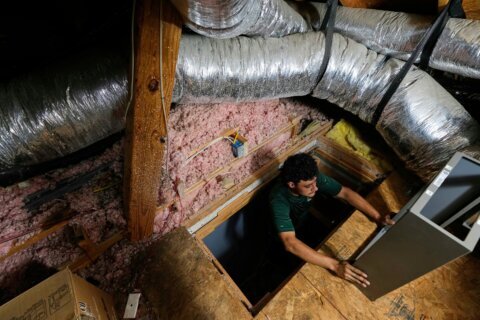It’s the holiday shopping season, with many customers going online to make their purchases. However, it’s not always clear whether the item you are buying is real.
Amazon and George Mason University’s Terrorism, Transnational Crime and Corruption Center brought together 11 teams of coders and college students from around the world to take on the global issue of online counterfeiting at the Bring Down Counterfeiting Hackathon 2022, held at the Department of Homeland Security’s Innovation Lab in Arlington on Saturday.
The winning team, Hyper Cube from Canada, won a $20,000 prize for their idea — an app that alerts consumers, with the snap a picture, to whether their purchase is a fake.
After taking a picture of their purchased item, the app would alert consumers if it’s a fake and then send the information to law enforcement to track the bad actors in the event the item is counterfeit.
Kebharu Smith, a former career prosecutor who now heads Amazon’s Counterfeit Crimes Unit, told WTOP that the e-commerce giant invested more than $900 million and has a team of over 12,000 people worldwide trying to tackle what he calls a “big problem” for the entire retail sector.
“Criminals and bad actors tend to stay a step ahead of law enforcement, and so we need to be thinking a step ahead of them by working with students and data scientists and engineers and coders to develop new and innovate ways to go after these bad actors, to beat them and meet them where they are,” Smith said.
An Amazon representative said there would be opportunities for partnership with the winning team down the road.
Organizer Louise Shelley — founder and director of the Terrorism, Transnational Crime and Corruption Center — said there are ways customers can try to protect themselves from fake items.
“Often the counterfeiters have products that you can see if you look at closely that are not authentic,” Shelley said.
She also cautioned that if a price is too good to be true, it probably is. She also recommends reading reviews to see if other shoppers have included comments about the product being inferior.
She warned that these products can pose health and safety risks.
“People can actually be harmed by this. They’re not just buying a knockoff of a consumer product. They are also enriching transnational criminal networks,” Shelley said.
The Organization for Economic Cooperation and Development estimates that the illicit trade of fake goods amounted to as much as $464 billion a year and makes up 2.5% of global trade.








